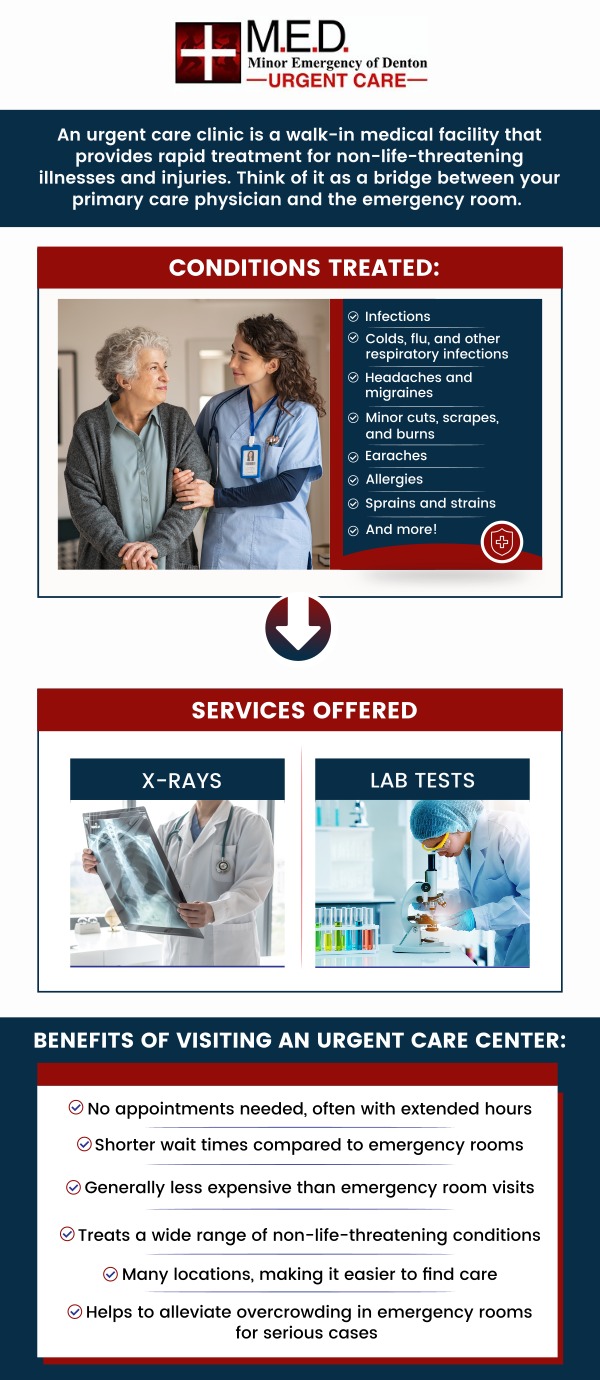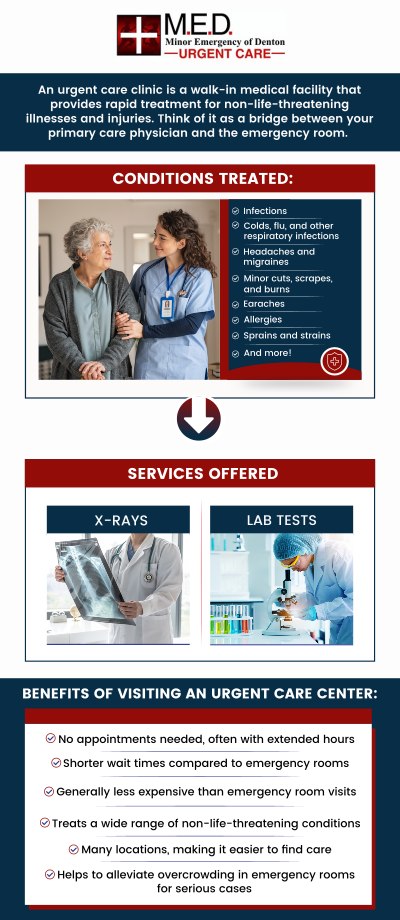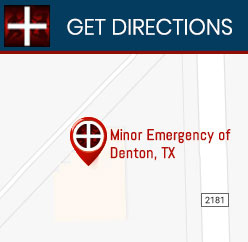When to Go to Urgent Care?
Consider going to an urgent care facility to obtain care that is often quicker and more affordable than going to an emergency room if you have a serious injury or sickness that is not life-threatening. Urgent care facilities offer many of the same fundamental medical treatments as a doctor’s office. When your doctor is not accessible, urgent care centers are the best option for non-emergency care since they are staffed with skilled professionals. For more information, please contact us or simply walk in! We are conveniently located at 4400 Teasley Ln #200 Denton, TX 76210.




Table of Contents:
What are the most common urgent care conditions?
When should you seek urgent medical attention?
What classifies a patient as urgent?
What is the difference between urgent and emergency care?
When you have a medical concern, it can sometimes be challenging to know whether you should call your doctor, visit an urgent care center, or go to the emergency room. In what follows, you can find out when the right time is to go to an urgent care clinic, as well as other helpful information about urgent care!
Urgent care clinics can treat a wide array of illnesses, injuries, and conditions, so long as they are not life-threatening or life-altering medical emergencies. In general, the conditions that urgent care clinics treat are serious enough to require urgent medical care, so you cannot wait for the next available appointment with your primary care doctor, but not so serious that you need to call 911. With that in mind, some of the most common conditions, illnesses, and injuries that urgent care clinics treat include:
• Allergic reactions
• Bronchitis
• Concussions
• Cuts and lacerations
• Diarrhea or vomiting
• Earaches and infections
• Eye irritations and infections, such as scratches or pink eye, also known as conjunctivitis
• Fractures and sprains
• Food poisoning, also called foodborne illness
• Hives, rashes, and skin infections
• Kidney stones
• Mononucleosis
• Pneumonia
• Poison ivy
• Sinus infections
• Sexually transmitted diseases (STDs)
• Stomach flu, or viral gastroenteritis
• Strep throat
• Urinary tract infections (UTI)
• Vaginitis
You should seek urgent medical attention, as opposed to emergency medical attention, if your injury, illness, or condition requires care within 24 hours. Some situations or symptoms that indicate you should seek urgent medical attention include:
• Accidents or falls where a fracture, sprain, or concussion is suspected
• Breathing difficulties, such as wheezing or shortness of breath
• Cuts or lacerations that require stitches but do not cause extensive blood loss
• Eye irritation, preventing your ability to see clearly
• High fever that lasts over three days or occurs with a severe headache, abdominal pain, or vomiting
• Broken bones that do not pierce the skin or deform the area
• Severe cough and sore throat
• Skin infections, especially if they are red, warm, swollen, and accompanied by a fever
• Persistent vomiting, diarrhea, or dehydration
A patient is classified as having an urgent medical concern if it requires medical care within 24 hours. If the patient does not receive medical attention for such concern within that 24-hour period, it could escalate into a medical crisis or emergency situation. In general, medical crises and emergency situations have the potential to be either life-threatening or life-altering, such as experiencing anaphylactic shock or going blind. However, urgent medical conditions do not pose a threat to a patient’s life or long-term quality of life if treated promptly.
The main difference between urgent care and emergency care is that urgent care clinics treat patients with urgent medical concerns that are not life-threatening or life-altering emergencies. In contrast, emergency care departments treat patients who are experiencing life-threatening or life-altering medical emergencies.
Urgent care clinics lack the proper equipment and resources to properly care for individuals dealing with such emergencies. Thus, if a patient comes to an urgent care clinic with a life-threatening or life-altering medical emergency, the urgent care clinic will call 911 and transfer them to the nearest emergency room via ambulance, providing necessary first aid until the ambulance arrives.
If you still have questions about when to go to urgent care, we’d be happy to answer them at Minor Emergency of Denton. Feel free to give us a call, visit our website, or come to our clinic for a walk-in appointment if you have a medical concern.
For more information, contact us. We are located at 4400 Teasley Ln #200, Denton, TX 76210.We serve patients from Denton TX, Corinth TX, Highland Village TX, Little Elm TX, Flower Mound TX, Lewisville TX, Southlake TX, and surrounding areas.
Check Out Our 5 Star Reviews










